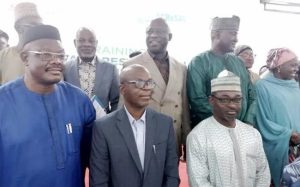Stakeholders who converged on Abuja have renewed commitment to tackle land degradation in 19 northern states and the Federal Capital Territory.

Mr Mahmud Kambari, Permanent Secretary of the Federal Ministry of Environment, said this on Monday, February 20, 2024, at a training programme on Land Restoration Techniques.
The training is a collaboration involving the Food and Agriculture Organisation (FAO) of the United Nations, and Agro-Climate Resilience in Semi-Arid Landscaped (ACReSAL) project financed by the World Bank.
Kambari said that the ACReSAL project is a pivotal initiative towards environmental conservation and sustainability.
He stated that land restoration is the responsibility of every stakeholder to sustain the ecosystem, foster biodiversity and mitigate climate change for the well-being of communities.
Also Dr Ibrahim Goni, Conservator-General of the National Park Service, said the park would continue to clamour for the effective protection of the seven parks to mitigate challenges from climate change.
“We are beneficiaries of ACReSAL projects in the area of solar power installation which has made our jobs easier,” Goni said.
He appealed for more engagements from ACReSAL projects to enhance the country’s biodiversity.
On his part, Dr Moctar Sacande, Land Technical Officer of the Project from FAO, said that the training is to ensure successful implementation of the project.
Sacande commended ACReSAL for the implementation of the project and the World Bank for financially facilitating the projects, adding that the training was orgainsed for the 19 northern states.
Mr Abdulhamid Umar, National Project Coordinator for ACReSAL, said that the act of landscape restoration requires serious drive and capacity building.
“Internationally, FAO is known to be an agency of the United Nations that has actually delivered severally on issues addressing challenges brought about landscape degradation.
“So, this lecture is training the trainers, these capacity building and techniques that are being impacted today is to give capacity and skill set for selected colleagues of ours from states and community level.
“This is so that they would transfer this skill set from Abuja to the community level,” Umar said.
Mr Andrews Seglah, a representative of the World Bank, said that the ACReSAL project is a huge step to acquiring a sustainable landscape restoration and a clean environment.
Seglah assured continued support by the World Bank and urged participant states to transmit regionally to people of their states especially at the grassroots for environmental sustainability.
By Abigael Joshua
